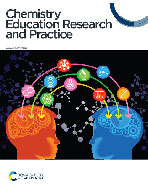The role of authentic contexts and social elements in supporting organic chemistry students’ interactions with writing-to-learn assignments
Abstract
Student affect is an important factor in the learning process and may be especially important in gateway courses such as organic chemistry. Students’ recognition of the relevance of the content they are learning and interactions with their peers can support their motivation to learn. Herein, we describe a study focused on how Writing-to-Learn assignments situate organic chemistry content within relevant contexts and incorporate social elements to support positive student interactions with organic chemistry. These assignments incorporate rhetorical elements—an authentic context, role, genre, and audience—to support student interest and demonstrate the relevance of the content. In addition, students engage in the processes of peer review and revision to support their learning. We identified how the authentic contexts and peer interactions incorporated into two Writing-to-Learn assignments supported students’ interactions with the assignments and course content by analyzing student interviews and supported by feedback survey responses. Our results indicate that assignments incorporating these elements can support student affect and result in students’ perceived learning, but that there should be careful consideration of the relevance of the chosen contexts with respect to the interests of the students enrolled in the course and the complexity of the contexts.


 Please wait while we load your content...
Please wait while we load your content...